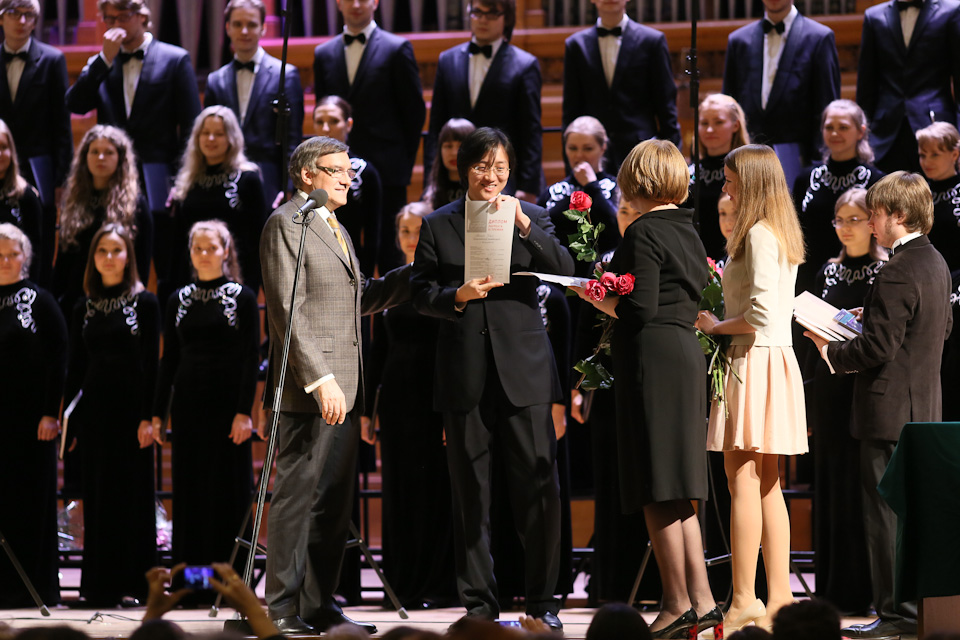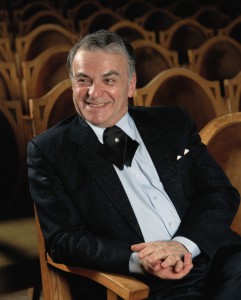Por Nelly Souslova, Administración de los Programas Educativos y Creativos de la Oficina para Festivales, Competencias y Eventos Especiales del Conservatorio de Moscú
Cada año en todo el mundo se celebran muchos festivales y competencia corales de diferentes niveles: para coros de niños o adultos, profesionales o aficionados. Los mejores grupos de cantantes reciben un muy merecido reconocimiento por su participación en estos eventos con sus directores. Las glorias del arte coral sólo pueden ser alcanzadas con el arduo trabajo diario del director junto con su equipo durante muchos, muchos años. Al escuchar las ejecuciones de los coros, el jurado realmente evalúa el trabajo de los directores, como en cualquier programa de competencia, aunque las habilidades del maestro tanto como las de los coristas se presentan en una unidad indisoluble.
Además hay otros factores importantes – económicos, sociales, culturales. Planteémonos lo siguiente; ¿qué tan a menudo el destino ofrece a un director coral novato las circunstancias ideales para desarrollar su talento? Difícilmente podamos dar una respuesta positiva. Es extremadamente difícil para un joven director organizar un nuevo equipo cuando hay tantos coros famosos con años de experiencia, tradición y premios. A pesar del cambio de generaciones de directores en estos grupos, la espera es bastante larga. Y alcanzar el reconocimiento del talento por parte del público es de vital importancia para que los jóvenes tengan una oportunidad de desarrollarse profesionalmente en el inicio de sus carreras.
Es esta contradicción lo que inició la idea en el Conservatorio de Moscú de establecer un nuevo formato de competencia. En marzo de 2014 se organizó la Primera Competencia Internacional Boris Tevlin de Directores Corales. Entre los participantes había jóvenes maestros, recién graduados y estudiantes de conservatorios de diferentes países. La competencia estaba estructurada como una tradicional aula de clases de dirección coral. Los competidores tenían que mostrar su conocimiento de las partituras corales con acompañamiento de piano; así como también hacer la demostración de un ensayo coral, con la participación del Coro de Cámara del Conservatorio de Moscú. Al trabajar con el mismo grupo (uno de los mejores de Moscú), todos los competidores estaban en igualdad de condiciones.
Esta agrupación merece una mención especial. El Coro de Cámara del Conservatorio de Moscú fue fundado en 1995 por Boris Tevlin. Bajo su dirección, el coro alcanzó reconocimiento mundial, recibió gran cantidad de prestigiosos premios y ejecutó numerosos estrenos. En 2012, cuando el gran maestro falleció, sus discípulos y seguidores decidieron bautizar la competencia con el nombre del profesor. Fue el sueño de su vida establecer un concurso profesional de jóvenes directores, y fueron sus ideas creativas las que se convirtieron en el fundamento de los términos de la competencia.
Boris Tevlin tuvo siempre una cuidadosa actitud respecto a los clásicos, pero al mismo tiempo, también promovía consistente y ferozmente la música contemporánea. “Prefiero evitar los caminos muy transitados, y las técnicas musicales y de composición han cambiado sustancialmente los últimos sesenta años y debemos ser capaces de ejecutarlas” – así explicó su gran interés por el nuevo repertorio. Muchas obras corales modernas fueron presentadas por primera vez bajo su dirección, y varias de ellas fueron escritas especialmente para sus coros.
Los organizadores del concurso trataron de impregnar el programa de la competencia con esta síntesis orgánica de tradición e innovación. A los participantes les fue requerido presentar tanto obras clásicas de Brahms, Verdi, Taneyev y Stravinsky, como obras corales de compositores de la talla de Agafonnikov, Barkauskas, Gubaidulina, Evgrafov, Kikta, Schnittke, Miskinis y Shchedrin. Estos últimos son nombres de nuestros compositores contemporáneos, y varios de ellos pudieron asistir a la competencia.
Impedido de presidir el jurado por razones de salud, el compositor Rodion Shchedrin envió sus cálidos saludos. Por petición suya, el presidente del jurado fue el maestro ruso Lev Kontorovich – director artístico y director en jefe del gran coro académico “Masters of Choral Singing”, conocido también como uno de los mejores grupos de Rusia.
El compositor lituano y director coral Vytautas Miskinis fue uno de los miembros del jurado junto con representantes de otros países: Angela Morales (Costa Rica), Theodora Pavlovich (Bulgaria), Cao Tongyi (China) y Gulmira Kuttybadamova (Kazakhstan). Cabe destacar que muchos de estos músicos estudiaron con el Profesor Tevlin y son los herederos y sucesores directos de su escuela.
En los inicios de la carrera de Boris Tevlin, las sutilezas de la dirección coral le fueron reveladas por Alexander Sveshnikov, durante los estudios de postgrado. Luego, Tevlin dirigió el Coro Académico Estatal Sveshnikov. Y continuó aprendiendo, como él decía, a sus estudiantes. Boris Tevlin exigía la más grande precisión y disciplina de los futuros maestros. Quizás esa es la razón por la cual sus discípulos son codiciados y contratados en todo el mundo. Él se mantuvo en contacto con la mayoría de ellos y nunca se negó a darles una mano. Adoraba admitir que los jóvenes son los que aportan la inspiración y el ímpetu para el arte. Y los graduados de ayer – ya maduros, sabios y con experiencia profesional – ocuparon los muy merecidos lugares en el panel calificador de la competencia.
Además de los dos coros mencionados, Tevlin estuvo a la cabeza de un gran número de agrupaciones a lo largo de los años, incluyendo el Coro de Jóvenes y Estudiantes de Moscú, el Coro Mixto de Directores y Maestros, y el Coro Ruso-Americano. El compositor Alexander Tchaikovsky dijo: “Todos los coros que él ha dirigido o dirige, tienen una precisión tonal absoluta, perfecta. Muy limpia. Probablemente, para él es una de las bases más importantes del arte coral”. Esta atención tan enfocada en la afinación, que es esencial en la ejecución de música moderna muy compleja, fue uno de los criterios de evaluación de la presentación de los competidores. Y por supuesto, la expresión de los gestos de dirección, la profundidad de la revelación de la imagen artística y la habilidad de obtener el sonido deseado de parte de los cantantes – a los participantes de la Primera Competencia Internacional de Directores Corales Boris Tevlin les fue requerido mostrar todas estas habilidades.
A pesar de que la competencia fue llevada a cabo por primera vez, el Comité Organizador recibió más de cincuenta postulaciones de participación provenientes de Rusia, China, Vietnam, Polonia, Suecia, Bielorrusia, Ucrania, Uzbekistán y Kazakstán. Sólo 29 competidores fueron seleccionados para participar en la primera ronda. 13 participantes pasaron a la segunda ronda y sólo 8 lograron llegar a las finales. Además de los representantes de diferentes escuelas nacionales, uno de los más emocionantes y serios duelos tuvo lugar entre los competidores de dos de los grandes centros culturales de Rusia – Moscú y San Petersburgo. El resultado final arrojó como ganador a la participante de San Petersburgo – Alexandra Makarova, y la decisión del jurado coincidió con la opinión del público. Su manera de dirigir fue incuestionable, profunda y profesional.
El Segundo lugar fue otorgado a un egresado del Conservatorio de Moscú – Gleb Kardasevich. El tercer lugar fue compartido entre Maria Chelmakina de Moscú y Wang Chao de China. Se otorgaron diplomas a otros tres participantes rusos y a Justina Helminska de Polonia. El programa en las finales incluía una presentación especial. Cada participante debía dirigir una composición, elegida luego de la segunda ronda, de entre un gran número de obras contemporáneas que habían sido anunciadas con anterioridad. El coro debía ensayarlas todas con antelación, por supuesto. Pero los participantes debían realizar su propia interpretación y conseguir de sus cantantes ese sonido que coincidiera con su concepto; y todo esto debía lograrse en apenas un ensayo corto de 15 minutos. Al final de la tercera ronda, estas obras fueron incluidas en el programa del concierto de la gala final, en el cual los finalistas fueron llevados al escenario del famoso Gran Salón del Conservatorio de Moscú.
Este evento fue una verdadera celebración del arte coral. Los medios de comunicación rusos cubrieron ampliamente el concurso en sus reportes. Los periodistas se interesaron tanto en la opinión de los participantes como en la de la exigente audiencia, y literalmente atacaron a los miembros del jurado en las conferencias de prensa. Semejante interés por una competencia de maestros corales no es coincidencia. Los asuntos relacionados al desarrollo del arte coral en la Rusia moderna, son manejados personalmente por la Suplente del Primer Ministro Olga Golodets. Las mayores fuerzas del país fueron reunidas bajo su patrocinio, y también la Sociedad Coral de Todos los Rusos (All-Russian Choral Society -ARCS) fue restablecida. Esta organización tuvo una larga y exitosa actividad en tiempos soviéticos, pero dejó de existir. La ARCS revivió ahora junto con sus actividades gracias al alto nivel de interés por parte del gobierno.
La Sociedad Coral de Todos los Rusos fue presidida por el renombrado director Valery Gergiev. La sociedad rusa espera que el resurgimiento de la ARCS marque el inicio de una nueva época de interés nacional por el canto coral.
La profesión de la dirección coral ha ganado una especial importancia en estas condiciones. Y el Conservatorio de Moscú asegura una experiencia única y de tradición en la educación de jóvenes maestros corales. El presidente del Comité Organizador de la Primera Competencia Internacional de Directores Corales Boris Tevlin – el Rector del Conservatorio de Moscú Alexander Sokolov, expresó su deseo de que la competencia sea llevada a cabo con regularidad. Incluso ahora una periodicidad de tres años está siendo considerada. El Conservatorio de Moscú tiene todas las condiciones para hacer esto. La organización de la competencia es manejada por la Administración de los Programas Educativos y Creativos, presidida por Ksenia Bonduryanskaya. Las tradiciones corales establecidas por el Profesor Tevlin son cuidadosamente preservadas por sus colegas en el Departamento del Arte Coral Moderno. La escuela de Boris Tevlin continúa viviendo en el sonido del Coro de Cámara creado por él. Este equipo es ahora guiado por su discípulo y sucesor, el Decano de la Facultad de Estudiantes Extranjeros, Alexander Solovyev. Fue su talento como organizador lo que lo llevó a juntar los esfuerzos de muchas personas para celebrar una competencia internacional de maestros corales y de esta manera, materializar el sueño del Profesor Tevlin.
Traducido del inglés por Vania Romero, Venezuela.
Revisado por Juan Casabellas, Argentina


